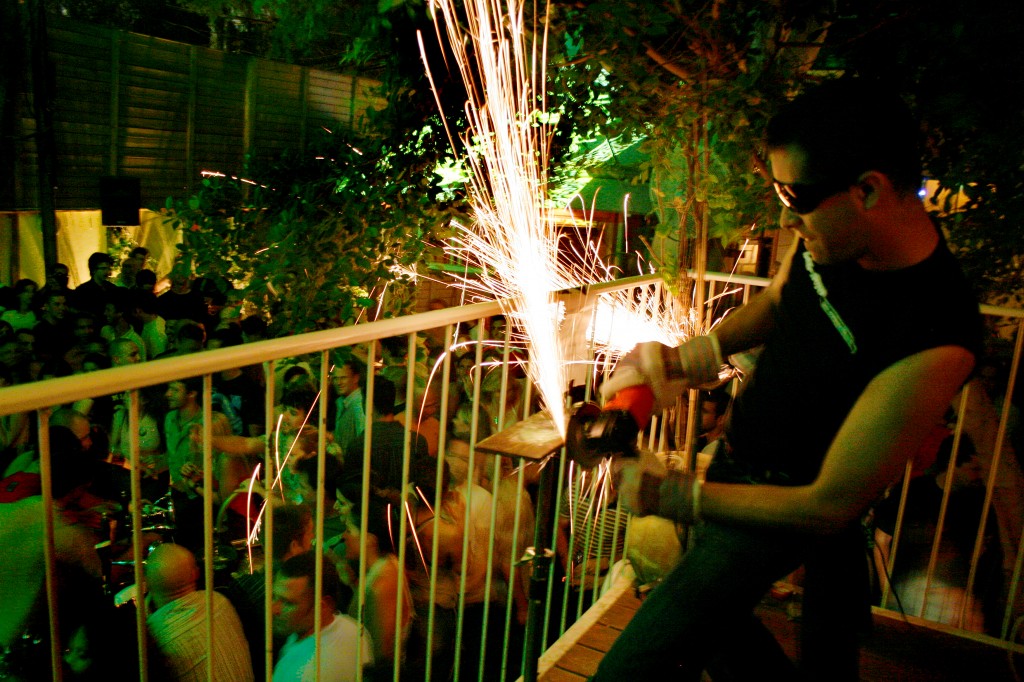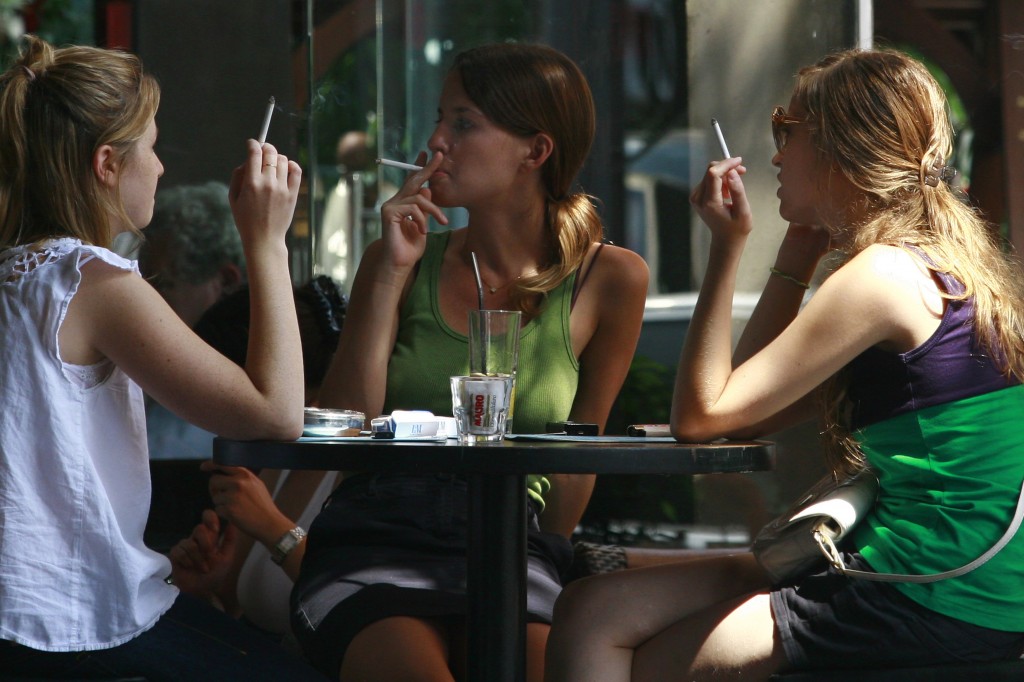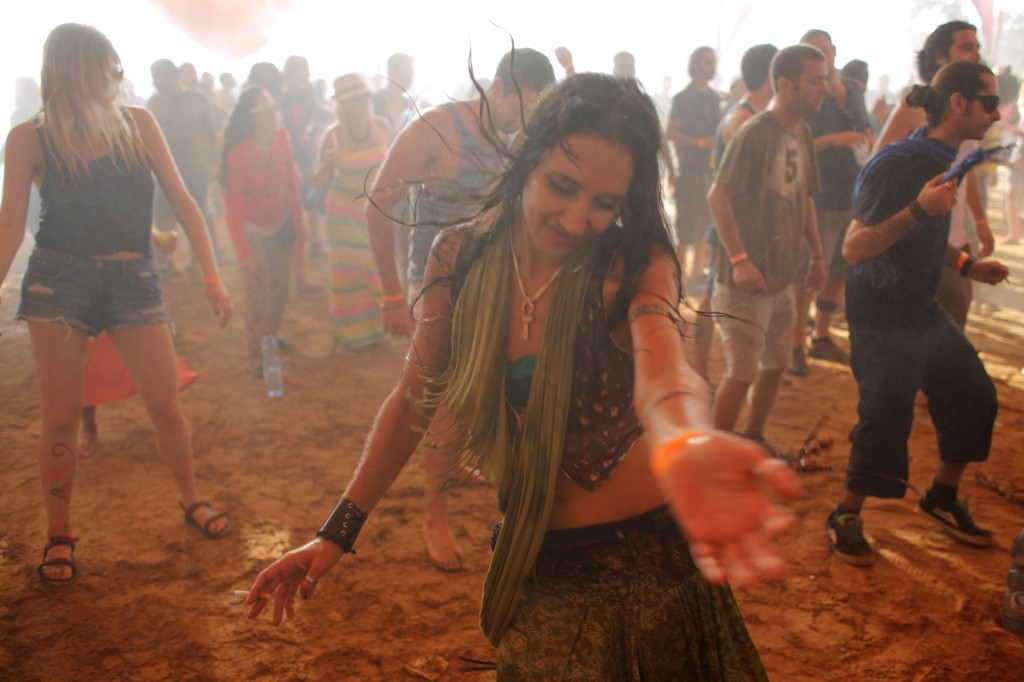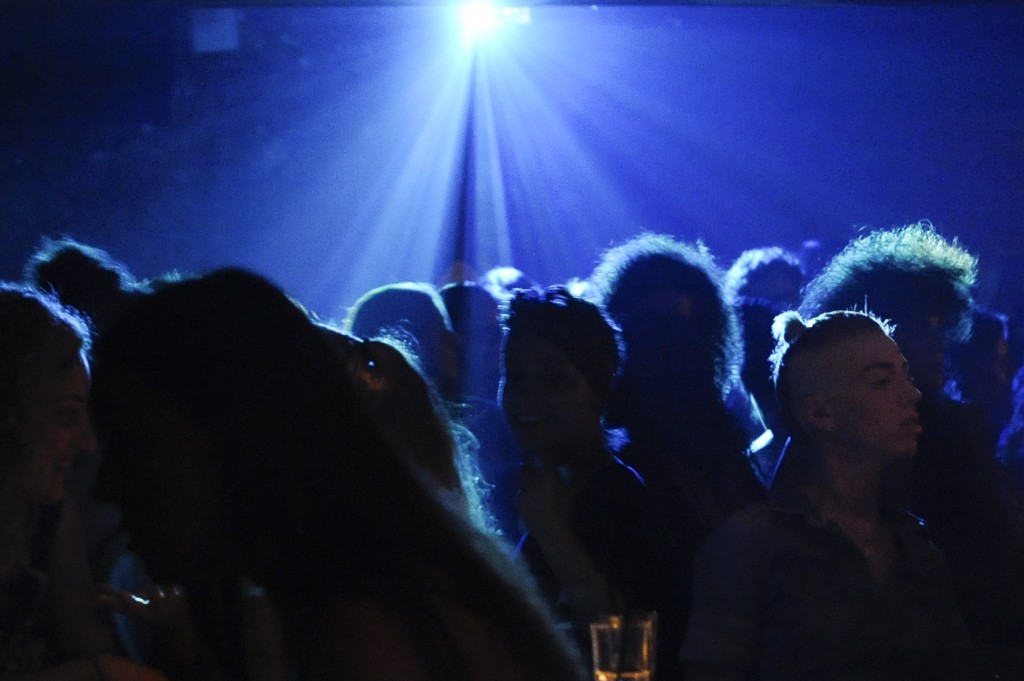What drives young secular North Americans to find themselves in the intensely hip, escapist-but-realist Tel Aviv scene? What makes them stay?
I’m sitting in a small room with a very high ceiling. There isn’t much light or natural air, the one window surrounded by the corpses of out-of-date electronics. There isn’t much of anything, really, just a few couches and an obtrusive square coffee table. The couches are filthy, covered with sad, dusty-looking quilted blankets. On the walls: a few ugly paintings made by the apartment’s previous inhabitants, which remained up because the new renters felt guilty throwing “art” in the trash.
I’m with a guy named Dave—not entirely sure where he is from. Some mix of English speaker and Israeli heritage. Maybe his parents are Israeli and he was born in the UK. Point is: now he lives in Tel Aviv. Dave dresses like a Tel Avivian—a t-shirt with the original sleeves and collars cut off, made into a tank top. Levis jeans, also altered, now shorts. No shoes. Lots of rope bracelets—souvenirs from a spiritual quest in India.
Dave has just come back from a nature party—Israeli kids love nature parties. A nature party is exactly what it sounds like, a party in nature. Israelis and their friends carpool out to some remote location (which is discovered only by calling a certain number and following instructions from one of the event planners) in either the desert or a forest. They arrive and construct a small city of tents, and then the party begins. DJs play for hours, MDMA and acid are dropped, peyote and marijuana are sparked. The sounds of trance music mixes with excited shrieks and yells and dissolves into the air. Sometimes a party is just 24 hours, sometimes three days. Adults paint their faces to look like fairies, new friendships are formed, and peace, love and magic enter the physical realm.
These parties aren’t my scene—the one time I went to a nature party someone accidentally broke my Jawbone speakers. I never recovered. I also hate trance music.
“So, you’re a writer, right?” Dave asks me, looking at me over a depleted bag of drum-rolling tobacco.
“Sometimes.”
“I’m writing a book.”
“Really?” I pass him rolling papers.
“Yeah—I have the title all figured out,” he winks at me.
“What’s the title?” I begin dreading the answer—in my experience, authors who have the title of their book figured out before the content is developed usually don’t have anything interesting to say.
“Lost Boys. I’ve been told I have a really unique, and amazing, perspective on life. I want to share that perspective with people. It’s crazy, man—like, we’re all lost, you know? But you know what makes me different?” Dave’s voice drops, he sparks the cigarette and he looks around, checking to see if anyone could be hiding behind the couches ready to steal his idea.
“What makes you different, Dave?”
“I know how to get home.”
Looking very pleased with himself, he continues. “Home isn’t always a literal house, man, sometimes it’s just a place inside you. That’s why I can go to these nature festivals, do a ton of acid, and not get too fucked up. I know how to get back home.” He looks at me with big, wide dinner plate eyes—hoping that I too get his philosophy, hoping that I could offer some further insight to the future work of Lost Boys. He begins to dramatically hit the center of his chest like a gorilla. “Home is here. Home is here.”
Tel Aviv is an island of lost boys and girls—all of us from near and far who have been drawn to the scene searching for stability, searching for a place to call home. American or Israeli, Canadian or European, all of us who have relocated to Tel Aviv tend to be running away from things, hoping to start anew, readjusting our masks hoping others believe our masks are really our faces.
I moved to Tel Aviv after spending six months living with my parents after already having moved out. Sick of being unemployed, I applied to some Jewish youth program which brought you over to Tel Aviv to work as a volunteer. I flew out a month later. Within a few months of participating in this program, and realizing I wasn’t a very helpful volunteer, I was discovered by a local model scout. A year later, I still call Tel Aviv home, and I work internationally as a model.
But I moved to Tel Aviv not because I strongly identified with the Jewish faith, nor had I thought that I would ever call Israel home. Before I lived in DC with my parents, I was living alone in Toronto. I had attended university, promptly dropped out after finding that I did not like exams nor care for school spirit, and swiftly joined the underground drug scene. My life was a mess, I was high all the time, I didn’t care about things I should have. I was making bad decisions left and right. I would get high to go to work, I would get high at lunch to continue the work, and then I would get high after work to wipe out the memory of the day. I was constantly numbing myself—I wasn’t really living.
When I moved to Tel Aviv, my lifestyle dramatically changed. Although Tel Aviv is known to the masses as a hedonistic destination, for me it was quite the opposite.
Israelis do not drink in the same fashion as Americans.
Ketamine is also not a thing in Tel Aviv.

A man uses a buzzsaw to create sparks at the opening party for Blend, a nightclub in Tel Aviv. Photo: Melanie Fidler / Flash90
Synthetic drugs are more common—instead of cocaine, one does amphetamines bought at a kiosk—and after one has done real drugs, synthetic drugs are always forever slightly disappointing.
I was also not interested in the nightlife scene: minimal house and trance music are not my favorite genre. I fell in with political hipsters who smoked pot at cafes and gave change to the hobos strung out on heroin.
Another case to prove the lost boys theory: a friend of mine named Aaron. I had gone to elementary school with him in DC, and when it was time for middle school we both went to different schools. We lost touch. Fast-forward many years, and I found myself at a show of his at a club in Tel Aviv, where he was DJ’ing.
One evening I was talking to Aaron about why he was in Tel Aviv. His story was not necessarily inspiring, but at the very least was entertaining. Aaron had gotten into trouble in high school in Potomac, Maryland. He was grappling with legal problems and drug addiction. He joined a program that brought young Americans to Israel, and never ended up leaving. He found friendly people, people who were genuinely invested in him, and new healthy hobbies. He doesn’t even smoke pot anymore, and DJ’ing pays his rent.
The reason Aaron’s story interests me so much is because I think it’s very symbolic of the differences in youth culture between the United States and Israel. Going out for drinks with friends is much more intense with Americans than it is with Israelis, or even Europeans. Young Americans drink to get properly wasted; they have multiple prescriptions for uppers, downers, or whatever, and everyone smokes a lot of pot. Young Tel Avivians are pot enthusiasts, but drink dramatically less than young Americans, and tend not to know what Percocet is. Young Americans get fucked up to escape—young Tel Avivians drink to celebrate the moment.

Israeli women smoke cigarettes while spending time at a cafe in central Tel Aviv. Photo: Kobi Gideon / Flash90
I think that’s because there is more opportunity for young people in Israel. 14.5 percent of American youth are unemployed, a rate much higher than Israel’s. Young Americans are crushed beneath an insane volume of debt. They’re pessimistic about their futures.
There are more available jobs in Tel Aviv, and most people tend to be doing multiple things at once. The notion of working as an artist, a photographer, a writer or a poet and not starving in the process isn’t farfetched. There are startups popping up every day. Café culture and good weather encourage frequent meetings with friends. You feel as if you really are a part of a community in a way that is harder to find in North America. Tel Aviv is a city that seems to work in one’s favor.
Before my conversation with Dave, I sat with my friend Ava at a favorite café behind the Shuk ha-Carmel. Ava comes from Long Island and made aliyah. She speaks Hebrew, and has a dog. At the time of our conversation, Ava had just returned back to Israel from a long trip home—the first time she had visited in two years. I asked her how her trip had been.
“It was weird,” she said. “In your brain you recognize you are home—this is where you are from, this is the place you miss the most when you have a tough day here in the city. But then you get there, and you feel so far away and detached from everything.”
I nodded in agreement, remembering my own recent trip to Toronto and finding that so much had somehow changed even though everything had remained exactly how I had left it. People were no longer at restaurant X but ate exclusively at new restaurant Y. Boutique whatsitcalled closed and was replaced with a condominium building. You begin to forget the names of streets you walked over a million times, and familiar faces and names slowly fade into the external hard drive of one’s distant memory.
“And you forget cultural things,” Ava added, coughing as cigarette smoke infiltrated our little area. “How to talk to people, when and where is appropriate to smoke, that sort of stuff. People also seem happier here. Back home, everyone seems so medicated.”
52 million people in the United States over the age of 12 have used prescription drugs non-medically in their lifetime. Americans consume three-quarters of the world’s prescription drugs. The youth of Tel Aviv tend to be more in shape (Israel’s obesity rate is less than half the rate of America’s), and spend a lot of their time out in nature. Fresh fruits and vegetables are the cheapest things to buy, and unhealthy food tends to be more expensive; compare that to North America, where Whole Foods and other organic stores are expensive, while McDonald’s can feed a family for under ten dollars. A good diet, sunshine, and light exercise do wonders for a person’s physique and state of mind. To find contentment when one is balanced is much easier of a task.
This doesn’t mean that Israeli youth aren’t struggling with who they are and why they are on this planet. The mindset of the Tel Aviv youth is similar to that of American youth in the 1970s: mistrustful of politicians as a result of wars and continued violence; obsessed with India and all things mystical. The cost of living in Tel Aviv is still slightly unrealistic, with salaries not necessarily covering one’s entire cost of living.
I was having a late-night conversation about politics with one of my roommates, an Israeli born in a settlement. I wanted to know what issues mattered the most to Israeli youth. I asked him how much people cared about the Occupation.
“Miranda, the Palestinian question is tricky,” he said. “We are so tired of talking about it. What really matters is when I’m going to get medicinal marijuana. One day, medicinal marijuana will be legal in Israel, and we will all smoke it and be so happy!”
My roommate also had an interesting explanation for why I never was privy to political conversations in Tel Aviv—and why Israeli youth seemed so averse to discussing politics.
“All the politicians are crooks and bad guys. We don’t trust them. The government is so corrupt. We don’t talk about it with you because you don’t speak enough Hebrew,”—fair enough—“and because Israelis don’t criticize what’s happening internally to outsiders. We complain to each other, but we are so used to being disliked we act united to the world. But we have a lot of internal complaints!”
Another friend of mine chimed in with a story about using ChatRoulette, a website that randomly connects you to people all over the world for webcam chats. With a simple swipe, you can end a conversation if you grow bored (or creeped out, as occurs in most cases). My friend was drunk with a friend decided to chat out of boredom. They ended up being matched with a group of drunk young people from Australia. They were all getting along surprisingly well, but when the Australians discovered where my friends were from, the conversation abruptly ended.
“Why do you think they ended the chat?” I asked her. She shrugged her shoulders, itched her forehead and responded.
“Everyone hates us. Sometimes we forget that.”
A friend of mine, named Eliran, moved to Tel Aviv from a small town in southern Israel. He is currently enrolled at Shenkar, a prestigious art and design school in Ramat Gan.
“What’s crazy here is how much people have going on behind the face they show you. We all have our stories, we all are a little messed up—but it’s OK because all of us are like this.”
Eliran came to Tel Aviv to escape sadness. His mother passed away unexpectedly from lung cancer when he was eighteen. He became a warrior in the military, and saw enough action and lost enough friends to traumatize him by twenty. He often smoked weed at night before bed to help him sleep—he couldn’t just fall asleep, he had to pass out, because what he saw when he closed his eyes was too much. But he also came to Tel Aviv for the same reasons anyone would want to go to New York: he had big dreams and wanted to make it in the big city.
“We are all carrying a world of weight on our shoulders. But it’s OK, because we find people like us and we share the load.”
This is true. I came to Israel to escape unemployment and a chemical love affair. All of us have our stories, we’re all Atlases with the sky on our shoulders, and we all pretend to be OK, until we find another kindred spirit to whom we share our story with.
Most of us in Tel Aviv think we have found a place to call home—maybe we’re right, maybe we’re not. But in the spring evenings when the smell of sweet honeysuckle hangs in the air, and the soothing sounds of salty sea waves echo along the beach, it’s a wonderful place to call home.
“Besides,” Dave concludes to me as he exhales long-held smoke from his lungs, “we’re all a bit lost anyways. No matter where we go, there we always are.” And with that, Dave winks and gets up. “Shit, man, where did I put my pot?”
![]()
Banner Photo: David Shankbone / Wikimedia







